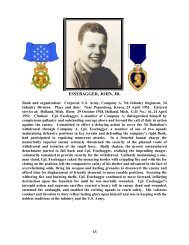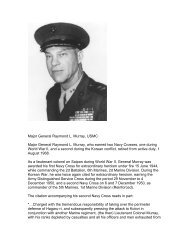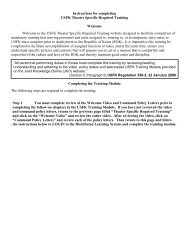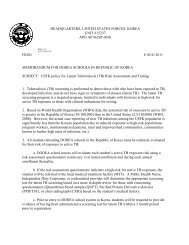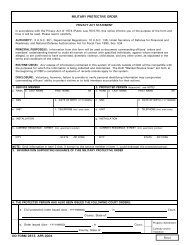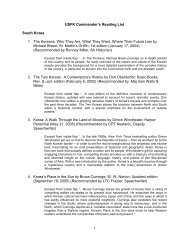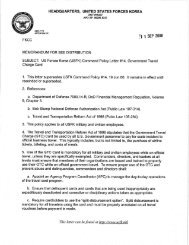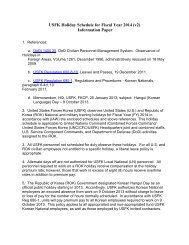Curtis Utz, Assault from the Sea, The Amphibious Landing, Naval ...
Curtis Utz, Assault from the Sea, The Amphibious Landing, Naval ...
Curtis Utz, Assault from the Sea, The Amphibious Landing, Naval ...
Create successful ePaper yourself
Turn your PDF publications into a flip-book with our unique Google optimized e-Paper software.
<strong>the</strong> production of consumer<br />
goods. Truman believed that<br />
it was more important to<br />
balance <strong>the</strong> budget and encourage<br />
<strong>the</strong> private sector<br />
than to buy new weapons or<br />
station large forces overseas.<br />
Key leaders in Washington<br />
also suggested that <strong>the</strong><br />
U.S. could reduce defense<br />
spending significantly because<br />
America had <strong>the</strong> atomic<br />
bomb. Proponents concluded<br />
that <strong>the</strong> American atomic<br />
arsenal (which was not that<br />
powerful or ready for war<br />
during <strong>the</strong> 1945-1950 period)<br />
ei<strong>the</strong>r would deter or defeat<br />
Soviet invasions of vital areas,<br />
such as western Europe. <strong>The</strong><br />
U.S. Air Force, separated<br />
<strong>from</strong> <strong>the</strong> Army in 1947, believed<br />
that <strong>the</strong> delivery of<br />
atomic weapons should be <strong>the</strong><br />
mission of only its bombers.<br />
<strong>The</strong> Air Force argued that<br />
this made conventional forces,<br />
especially Navy carrier forces,<br />
much less valuable and that<br />
<strong>the</strong>y should be reduced in<br />
number and capability. <strong>The</strong><br />
Navy countered that a balanced<br />
military establishment,<br />
in which no weapon system<br />
or service predominated,<br />
best served <strong>the</strong> global interests<br />
of <strong>the</strong> United States.<br />
All <strong>the</strong> services were involved<br />
in sometimes<br />
acrimonious disputes over<br />
dwindling budgets, <strong>the</strong>ir respective<br />
roles and missions<br />
in <strong>the</strong> new postwar world,<br />
and unification of <strong>the</strong> defense<br />
establishment. James V.<br />
Forrestal, <strong>the</strong> first Secretary<br />
of Defense (<strong>the</strong> National<br />
Military Establishment, later<br />
to become <strong>the</strong> Department<br />
of Defense, was established<br />
in 1947), literally worked<br />
himself to death trying to<br />
accommodate <strong>the</strong> differing<br />
views of each service. His<br />
successor, Louis V. Johnson,<br />
an incompetent political appointee<br />
with little experience<br />
in defense matters, reinforced<br />
Truman’s inclination to<br />
drastically cut <strong>the</strong> defense<br />
budget. Johnson also accepted<br />
<strong>the</strong> proposition that only<br />
<strong>the</strong> Air Force should be allowed<br />
to conduct long-range<br />
atomic bombing. Without<br />
consulting <strong>the</strong> Navy’s civilian<br />
or military leaders, he canceled<br />
construction of United<br />
States (CVA 58), <strong>the</strong> first<br />
aircraft carrier designed to<br />
carry atomic-capable aircraft.<br />
In <strong>the</strong> uproar over this and<br />
o<strong>the</strong>r issues, collectively called<br />
e<br />
oa<br />
n early 1950, international<br />
miscalculation over Korea<br />
resulted in war. For several<br />
years, Kim 11 Sung had<br />
urged his Communist patrons<br />
to support a North Korean<br />
invasion of South Korea but<br />
<strong>the</strong>y refused him each time.<br />
<strong>The</strong> leaders of <strong>the</strong> Soviet<br />
Union and <strong>the</strong> People’s Republic<br />
of China did not want<br />
a major war to break out in<br />
nor<strong>the</strong>ast Asia. Stalin was<br />
more concerned about <strong>the</strong><br />
growing strength of <strong>the</strong> North<br />
Atlantic Treaty Organization<br />
alliance in Europe.<br />
Mao Zedong was concentrat-<br />
<strong>the</strong> “Revolt of <strong>the</strong> Admirals,”<br />
Secretary of <strong>the</strong> Navy John<br />
L. Sullivan resigned in protest<br />
and his successor forced<br />
Admiral Louis E. Denfeld, <strong>the</strong><br />
Chief of <strong>Naval</strong> Operations<br />
(CNO), to retire.<br />
During <strong>the</strong> period <strong>from</strong><br />
1945 to 1950, all <strong>the</strong> services<br />
suffered <strong>from</strong> <strong>the</strong> loss of critical<br />
resources. <strong>The</strong> last budget<br />
approved by Congress before<br />
<strong>the</strong> outbreak of <strong>the</strong> Korean<br />
War provided for only 238<br />
naval combatants, including<br />
6 fleet aircraft carriers, 1 reduced-status<br />
battleship and<br />
9 carrier air groups; 6 battalions<br />
and 12 aircraft squadrons<br />
for <strong>the</strong> Marines; and 14<br />
reduced-strength Army divisions.<br />
Even <strong>the</strong> favored Air<br />
Force was expected to operate<br />
with 48 air groups instead of<br />
<strong>the</strong> 71 it considered essential.<br />
0 a<br />
ing his forces for <strong>the</strong> invasion<br />
of Taiwan and climactic last<br />
battle with Chiang Kai-shek’s<br />
Nationalists.<br />
<strong>The</strong> United States did not<br />
want a war in Asia, ei<strong>the</strong>r.<br />
<strong>The</strong> Truman administration<br />
focused its attention and <strong>the</strong><br />
combat power of <strong>the</strong> U.S.<br />
military on Europe. Truman<br />
and his Secretary of State,<br />
Dean Acheson, were determined<br />
to limit U.S. Far<br />
Eastern commitments, a<br />
desire unfortunately made<br />
public. On 12 January 1950,<br />
Acheson told <strong>the</strong> Washington<br />
press corps that <strong>the</strong> United



